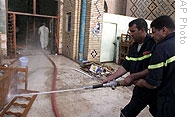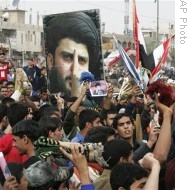-
(单词翻译:双击或拖选)
 |
| Firemen hose down the site where a suicide bomber blew himself at a Shiite mosque, 28 Nov 2008 |
The explosion at the Shi'ite mosque appeared to be aimed at supporters of Moqtada al-Sadr who had criticized the military agreement and urged followers5 to wear black to mourn the passage of what he called, "a humiliating accord."
A police spokesman said that the bomber blew himself up amid a throng6 of some 300 worshippers, disrupting prayers, and laying waste to the building.
The same mosque was targeted almost three and a half years ago by a truck bomb that was detonated outside the building, killing 70 people.
Media reports said that the congregation of the mosque was mostly loyal to Moqtada Sadr, and that its top clerics belong to his movement.
A top Sadr deputy, Aws al Khafagi, told followers that his movement would "continue rejecting the humiliating accord," which the Iraqi parliament voted to approve Thursday.
Sadr's bloc7 of 30 deputies raised banners, chanted, and pounded tables with their fists Thursday, in a bid to block the vote to approve the new U.S.-Iraq pact, which takes effect on January 1.
Analyst8 Paul Salem of the Beirut-based Carnegie Center for Peace in the Middle East thinks that violence will continue in Iraq, following the vote to approve the new military pact.
"These bombings will continue," he said. "There's serious and ongoing9 security problems in Iraq and simmering civil wars of various types. Those never ended and are not likely to end any time soon," said Salem. "The agreement that was approved Thursday is very contentious10; many groups opposed it…. many groups had already been opposing the Maliki government and opposing the U.S. presence from before this agreement, so no, I don't think we've entered a fundamentally new phase."
Salem also thinks that Sadr will continue to oppose the U.S. presence in Iraq, if just to increase his own power base.
 |
| Followers of Shi'ite cleric Muqtada al-Sadr hold his portrait during an anti-U.S. protest in Sadr City in Baghdad, 28 Nov 2008 |
"Well, I mean, I can't exactly predict how they'll react," he said. "I'm sure they will react somewhat negatively, but their position against the pact goes beyond being against the pact itself and being against the U.S. presence. It also reflects an internal struggle for power and clearly Muqtada Sadr has thrown in his fortunes with the opposition11 to the [U.S.] presence and figuring that well, the presence will stay for now and he knows that, but he can capitalize politically a lot on being leader of the opposition and setting himself up for a wider political base," said Salem.
A demonstration12 by Sadr loyalists in Baghdad's Firdous Square, exactly one week ago, brought together thousands of opponents of the Iraqi government and of the new military pact with the U.S. Sadr is now, once again, calling on supporters to close shops, offices and other institutions for "three days of peaceful protests."
 收听单词发音
收听单词发音
1
bomber

|
|
| n.轰炸机,投弹手,投掷炸弹者 | |
参考例句: |
|
|
|
2
mosque

|
|
| n.清真寺 | |
参考例句: |
|
|
|
3
killing

|
|
| n.巨额利润;突然赚大钱,发大财 | |
参考例句: |
|
|
|
4
pact

|
|
| n.合同,条约,公约,协定 | |
参考例句: |
|
|
|
5
followers

|
|
| 追随者( follower的名词复数 ); 用户; 契据的附面; 从动件 | |
参考例句: |
|
|
|
6
throng

|
|
| n.人群,群众;v.拥挤,群集 | |
参考例句: |
|
|
|
7
bloc

|
|
| n.集团;联盟 | |
参考例句: |
|
|
|
8
analyst

|
|
| n.分析家,化验员;心理分析学家 | |
参考例句: |
|
|
|
9
ongoing

|
|
| adj.进行中的,前进的 | |
参考例句: |
|
|
|
10
contentious

|
|
| adj.好辩的,善争吵的 | |
参考例句: |
|
|
|
11
opposition

|
|
| n.反对,敌对 | |
参考例句: |
|
|
|
12
demonstration

|
|
| n.表明,示范,论证,示威 | |
参考例句: |
|
|
|















